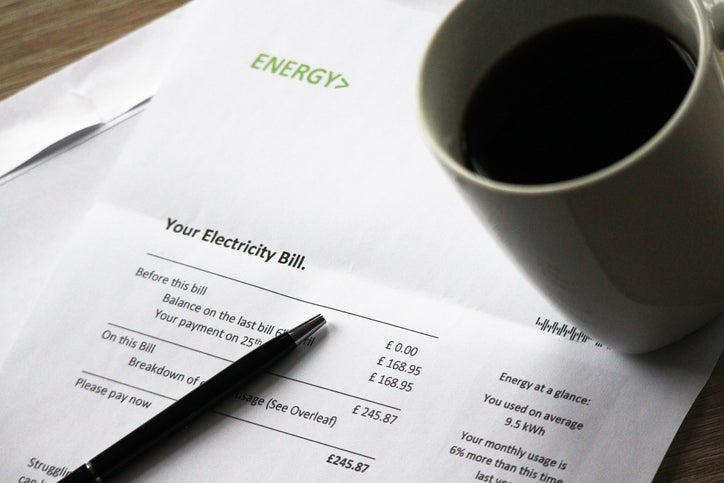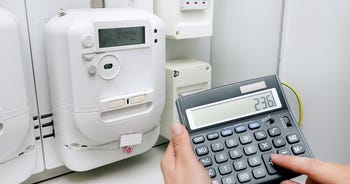What are Direct Debit energy bills and how do they work for my business?
Business energy can be tricky to understand, especially when you’re just trying to get your business off the ground. But getting a handle on it can help you understand costs and the best way to pay your bills.
If you pay your business energy bills monthly, you’ll be on a Direct Debit plan. But what exactly are Direct Debits, and how can this payment method work for your business? We've got all the info you need in this guide.

How do Direct Debits for energy work?
Paying by Direct Debit is a simple automated way to pay your energy bills. Once a Direct Debit is set up on your account, the money will be automatically taken out on an agreed date. This way, you won’t have to worry about paying for your energy once your bill arrives.
Most people pay by Direct Debit because it allows them to spread the cost of their energy across the year.
How to set up a Direct Debit for your business energy bills
Setting up a Direct Debit with your supplier should be straightforward. If you set up a Direct Debit online, most suppliers will have a dedicated dashboard or hub for current members where you’ll be able to find all your account details.
Once you’ve logged in or registered for a new account, you’ll need to have these handy:
- Your login details
- A recent meter reading for your gas or electricity
- Bank sort code and account number
- The date you’d like to pay your Direct Debit monthly — Most suppliers will offer dates between the 1st-28th of the month
What is a quarterly Direct Debit?
A quarterly Direct Debit means you'll be billed every three months. Instead of organising payment each time, the money will automatically be taken from your bank account on its due date.
Some suppliers will offer a discount fo quarterly Direct Debit payments. However, the discount might be similar to a monthly Direct Debit discount, so explore all your options before deciding.
Is it cheaper to pay your business energy bill by Direct Debit?
Direct Debit is often the cheapest way to pay your energy bills. Some suppliers offer a discount if you agree to pay by Direct Debit. This is largely because it's easier for suppliers to take payment in this way - automated transactions cut admin costs and the risk of late payments - and it also means they know exactly how much they're getting each month.
But you should always check your supplier's terms, as some may charge extra for failed Direct Debit payments or require estimated billing, which might not always reflect your actual energy usage.
What are the advantages of using Direct Debit for your energy bills?
There are several advantages of paying your business energy bills by Direct Debit, including:
- Save money - Many suppliers offer discounts for Direct Debit payments, reducing overall energy costs.
- Less admin - Payments are made automatically, preventing missed or late payments and reducing administrative work as there's no need to manually process invoices each month.
- Help with cash flow - Fixed Direct Debit plans allow businesses to budget more effectively with predictable monthly payments.
- Avoid late fees - Since payments are processed automatically, businesses can avoid late payment penalties.
- Improved credit rating - Consistent, on-time payments via Direct Debit can help maintain a positive credit history for your business.
Are there any drawbacks to paying energy bills by Direct Debit?
Yes, while Direct Debit is generally a convenient and cost-effective way to pay business energy bills, there are some potential drawbacks to consider:
- Risk of overpayments - If your supplier estimates usage rather than basing payments on actual consumption. This can lead to overpaying if usage is lower than expected. If this happens, you can claim back any money owed. Find out how to do this in our guide to business energy bills.
- Less control over payments - Payments are taken automatically, which means businesses might not notice errors or discrepancies in their bills until later.
- Bank charges and credit rating issues - If there isn’t enough money in your business account when a Direct Debit is due, it could result in bank charges and could affect your credit score.
- Difficulty in disputing payments - If a supplier takes more than expected, you may need to chase refunds or dispute incorrect charges, which can take time.
- Variable payment amounts - Unless on a fixed Direct Debit plan, payments can fluctuate based on usage, making budgeting more difficult.
To lessen these risks, regularly check your energy bills, submit meter readings (unless you have a smart meter, in which case this is done automatically), and check for any errors in estimated charges.
What happens to your Direct Debit if you switch energy suppliers?
When you switch energy suppliers, your existing Direct Debit will usually be automatically cancelled by your old supplier. But you need to check that this has been done to make sure they don't keep taking payments.
Here's what usually happens to your Direct Debit when you switch:
- Final bill & refunds - Your old supplier will generate a final bill based on your last meter reading. If you owe money, your Direct Debit may still be used to collect the outstanding balance before being cancelled. If you’ve overpaid, your old supplier should issue a refund to your bank account.
- Setting Up a New Direct Debit - Your new supplier will ask you to set up a Direct Debit as part of the switch process. The first payment may be taken shortly after the switch, depending on your billing cycle.
What costs make up a business energy bill?
Business energy bills are made up of a number of costs — it isn’t just the gas and electricity that your business uses! Typically your energy bill will also include:
- Wholesale costs — These are the costs you’ll pay for the energy bought to supply your business. These typically make up about a third of your energy bill. The supplier will buy the energy from gas producers and electricity generators on the wholesale market.
- Network costs — Network companies charge your supplier a regulated price for the use of the energy network. This is for all the gas pipes and electricity cables that carry energy across the country into your business.
- Social and environmental obligation costs — Larger supplies have to contribute to costs toward the government energy policies. These costs aim to encourage the take-up of renewable technology, support energy efficiency improvements in homes and businesses, and more.
- Supplier operating and margin costs — When a supplier sets prices, they’ll take into account their operating costs as well to make a profit. These operating costs will cover things such as the general running of an energy business and customer service fees.
- Direct costs — These costs cover things like meter maintenance and installation, third-party services, administration costs and more.
What to do if you can’t afford to pay your Direct Debit?
If you can’t afford to pay your energy Direct Debit, you first need to get in touch with your supplier and explain your situation. This way, they can offer advice, support and solutions, which could include an affordable repayment plan.
If you don’t contact your supplier and try to negotiate a solution, they may threaten to install a prepayment meter or even disconnect you.
What happens if you miss a Direct Debit payment?
If you miss a payment, your supplier may ask you to pay a one-off sum to clear the remaining balance you owe on your account.
In some cases, suppliers may not be able to offer you any further payment arrangement help until you’ve cleared the outstanding balance on the account. They should, however, look at your payment history and assess the situation from there.
If you’re struggling to afford your energy bills and you’re not sure about the next steps, our guide can help.
Can you choose the start date for my Direct Debit?
When you’re setting up your payment, you should be able to choose a date between the 1st and 28th of the month.
Make sure to choose a date that best suits your cash flow — most people and businesses tend to choose a date that’s a few days after they’ve been paid.
Why are energy Direct Debits increasing?
The amount you pay for your business energy will be an estimate from your supplier based on the amount of energy you’re predicted to use over a year. If you notice that your payments have increased, this could be because you’re using more energy than your supplier estimated.
One way to avoid estimated bills is to send regular meter readings to your supplier. You could also get a smart meter fitted as this will automatically send regular meter readings.
If your business uses a lot of electricity and has a peak demand is no lower than 70KVA every half hour, then it's worth considering a half-hourly meter to make help make sure your bills and Direct Debits are accurate. If your business has a peak electricity demand of 100KVA or more every half hour, then having a half-hourly meter is mandatory
Another reason your energy Direct Debits could be increasing is that energy costs have risen considerably over the last 12 months. There are many reasons why prices have been so volatile, including increased demand, a shortage of space and limited supplies. Find out more at our blog about what is going on with energy prices in the UK.
What happens if you use less energy than the Direct Debit amount?
If you use less energy than your monthly payment amount, then you’ll build up credit on your account.
You’ll usually build up credit in the summertime as you use less, but you’ll likely need this surplus during winter when you use more.
Depending on how much credit you have on your account, you can claim this back from your supplier. You can claim this anytime, but you should leave some funds in your account to cover higher energy costs during the colder months. To claim, you’ll have to get in contact with your supplier and tell them how much credit you’d like to be refunded back to you.
Your supplier might not offer a refund if they have a good reason. For example, they may not offer you a refund if you only have a small amount of credit on your account.
What happens to a Direct Debit when you switch energy suppliers?
When you switch business energy suppliers, you’ll be asked to set up a new Direct Debit with the new supplier.
Once your final bill and any outstanding payments have been made to your old supplier, you should make sure that the Direct Debit is cancelled on your account and delete your card information. You can also contact your bank to make sure that the payment has been cancelled and that you won’t be charged the following month.
Get your business energy sorted with Bionic
At the end of the day, wrapping your head around Direct Debits is one of the most important things you can do to help your business. If you need more help understanding your energy bills or anything else energy-related, head over to our energy guide page for more information.
Get in touch today with the Bionic team to discuss your needs or get more information on business energy. Our tech-enabled experts can help you compare business electricity and business gas deals. We can also help with a range of other business essentials.








